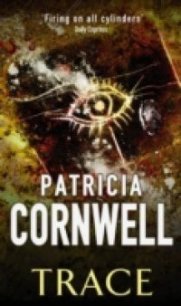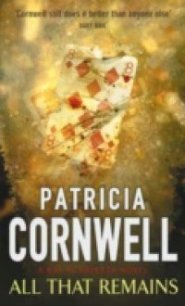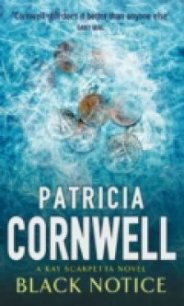The Last Precinct - Cornwell Patricia (читаем книги онлайн TXT) 📗
I call fingerprints section chief Neils Vander at home and explain the situation, and he says he will meet us at the motel
in two hours. Marino is caught up in other preoccupations, his
attention fixated on some spot above the bed, where he is shining the light. "Holy shit," he mutters. "Doc, would you look at this?" He illuminates two sooty eyebolts screwed into the dry wall ceiling about three feet apart. "Hey!" he calls through the doorway to Kiffin.
She peers inside the room and looks where he shines the light.
"You got any idea why these bolts are in the ceiling?" he asks her.
She gets a strange expression on her face, her voice going up a note, the way it does when she is being evasive, I think. "Never seen them before. Now I wonder how that happened?" she declares.
"Last time you were in this room was when?" Marino asks her.
"A couple days before he checked in. When I cleaned it after the last person checked out, the last person before him, I mean."
"The bolts weren't here then?"
"I didn't notice, if they were."
"Mrs. Kiffin, you just hang outside there in case we got more questions."
Marino and I put on gloves. He splays his fingers, rubber stretching and snapping. The window next to the back door overlooks a swimming pool that is filled with dirty water. Across from the bed is a small Zenith television on a stand, a note taped to it reminding guests to turn the TV off before they go out. The room is rather much what Stanfield described, but he did not mention the Gideon Bible open on the dresser, or that to the right of the bed near the floor there is an electrical outlet with two unplugged cords on the carpet next to it, one to the lamp on the bedside table, the other to the clock radio. The clock radio is old. It isn't digital. When it was unplugged, the hands stopped at 3:12 P.M. Marino tells Kiffin to step inside the room again. "What time did you say he checked in?" he asks.
"Oh, 'round three." She is just inside the doorway, staring blankly at the clock. "Looks like he came in and unplugged the clock and the lamp, now doesn't it? That's kind of strange, unless maybe he was plugging something else in and needed the outlet. Some of these business types have those laptop computers."
"Did you notice if he had one?" Marino glances at her.
"I didn't notice he had anything except what looked like a car key and his wallet."
"You didn't say nothing about a wallet. You saw a wallet?"
"Pulled it out to pay me. Black leather, as I recall. Expensive looking, like everything else he had. Might have been alligator or something," she adds to her story.
"How much cash he pay you and in what kind of bills?"
"A hundred-dollar bill and four twenties. He told me to keep the change. The total was one hundred and sixty dollars and seventy cents."
"Oh yeah. The sixteen-oh-seven special," Marino says in a monotone. He doesn't like Kiffin. He certainly doesn't trust her worth a damn, but he keeps it to himself, playing her like a hand of cards. If I didn't know him so well, he might fool even me.
"You got some kind of stepladder around here?" Marino says next.
She hesitates. "Well, I guess so." She is gone again, the door left standing wide open.
Marino gets down to take a closer look at the outlet and unplugged cords. "You think they plugged the heat gun in here?" He ponders this out loud.
"It's possible, //"we're talking about a heat gun," I remind him.
"I've used them to thaw my pipes and to get ice off my front steps. Works like a charm." He is looking under the bed with the flashlight. "Never had a case where one was used on a person. Jesus. He must've been gagged pretty good for no one to hear anything. Wonder why they unplugged both things, the lamp and the clock?"
"Maybe so it didn't throw the circuit breaker?"
"In a joint like this, yeah, maybe. A heat gun's probably about the same voltage as a blow-dryer. One-twenty, one-
twenty-five. And a blow-dryer would probably knock out the
lights in a dump like this."
I move over to the dresser and look at the Bible. It is open to the sixth and seventh chapters of Ecclesiastes, and the ex- posed pages are sooty, the area of dresser under the Bible spared, indicating this was the position the Bible was in when the fire started. The question is whether the Bible was open like this before the victim checked in, or does it even belong with the room, for that matter? My eyes wander down lines and stop at the first verse of the seventh chapter. A good name is better than precious ointment; and the day of death than the day of one's birth. I read it to Marino. I tell him that this section of Ecclesiastes is about vanity.
"Kind of fits with the queer thing, don't it?" he comments as aluminum scrapes outside and Kiffin returns with a rush of wintry air. Marino takes a paint-spattered, bent ladder from her and opens the legs. He climbs up and shines the flashlight on the bolts. "Damn, I think I need new glasses. I can't see nothing," he says as I hold the ladder steady.
"Want me to look?" I offer.
"Help yourself." He climbs back down.
I take a small magnifying lens from my satchel and up I go. He hands me the light and I examine the eyebolts. I can't see any fibers. If there are any, we are not going to have any luck collecting them here. The problem is how to preserve one type of evidence without ruining another, and there are three possible types of evidence that might be associated with the eyebolts: fingerprints, fibers and tool marks. If we dust off soot to look for latents, we might lose fibers that could match the ligature that might have been threaded through the eye-bolts, which we also can't unscrew without risking the introduction of new tool marks, assuming we use a tool such as pliers. The biggest threat is inadvertently eradicating any possible prints. In fact, the conditions and lighting are so bad that we shouldn't be examining anything here, really. I get an idea. "If you can hand me a couple baggies," I tell Marino. "And tape."
He hands me two small, transparent plastic bags. I slip one over each eyebolt and carefully wrap tape around the top of the bag, careful not to touch any part of the bolt or the ceiling. I climb back down while Marino opens his tool box. "Hate to do this to you," he says to Kiffin, who hovers outside the door.
hands deep in her pockets, trying to keep warm. "But I'm gonna have to cut out part of the ceiling."
"Like that's gonna make much difference at this point," she says in a voice of resignation, or is it indifference I detect? "May as well," she adds.
I am still wondering why the fire only smoldered. This has really got me stuck. I ask Kiffin what type of linens and mattress cover were on the bed.
"Well, they were green." She seems sure of herself on this point. "The bedspread was dark green, sort of like the color the doors are painted. Not that we know what happened to the linens. The sheets were white."
"Do you have any idea what they were made of?" I ask.
"I'm pretty sure the bedspreads are polyester."
Polyester is so combustible that I try to remember never to wear synthetic materials when I fly. If we have a crash landing and there is a fire, the last thing I want against my flesh is polyester. I may as well douse myself with gasoline. If a polyester bedspread had been on the bed when the fire was set, more than likely the entire room would have gone up in flames, and quickly. "Where did you get the mattresses?" I ask her.
She hesitates. She doesn't want to te'l me. "Well," she finally gets around to what I believe is the truth, "new ones are awfully expensive. I get secondhand ones when I can."
"From where?"
"Well, from that prison they closed down in Richmond a few years back," she tells me.
"Spring Street?"



